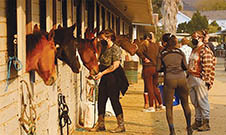- 영장심사 위해 서울구치소 나선 尹…지지자들 “기각하라” 함성
- 與, ‘인지 수사’ 살린 野특검법에 “이재명 정적 수사도구 될것”
- 野 “’내란 특검법’ 與 요구 대폭 수용…崔대행, 즉각 공포하라”
- 尹변호인단 “영장심사서 윤대통령 직접 발언할 것…내란아냐”
- 8년전 反트럼프 외쳤던 분홍모자 물결…2기 취임식엔 잠잠
- ‘내란 혐의’ 尹 영장심사 시작…이르면 한국 18일 밤 늦게 구속여부 결정
close
- 뉴욕증시, 믿어 본다 트럼프…나스닥 1.51%↑ 마감
- 비트코인, ‘트럼프 행정명령’ 기대에 랠리…10만4천달러선 회복
- PECHANGA PLEDGES $500,000.00 TO AID LOS ANGELES FIRE VICTIMS
- Koreans Account for 22% of Property Purchases in LA Koreatown
- Biden’s Farewell Address Warns of Power Concentration Among the Wealthy
- Arrest Warrant for President Yoon on Insurrection Charges Filed by Corruption Investigation Office – A First in South Korean History
close
- 오타니, LA 산불 피해 지원 위해 50만달러 기부
- LA 산불로 PGA 투어 제네시스 인비테이셔널 개최 코스 변경
- ‘골맛’ 본 손흥민… 팀 역전 당해 패배 ‘쓴맛’
- FA 김하성, 5월 돼야 출전 가능… 새 행선지는 아직 미지수
- [전익환 프로의 골프교실] 스윙의 방향전환
- 손흥민, 북런던 더비서 리그 6호골…토트넘은 1-2 패배
close
- 슬기로운 시니어 생활 9회
- LA 산불로 동물들 피해… 구조 위해 나선 사람들
- 슬기로운 시니어 생활 제 8회 “ 시니어라 신나요”
- 태생이 핫플!.. ‘계엄 모의’ 45세 롯데리아 속 한국사
- 슬기로운 시니어 생활 제 7회 “건강한 삶은 나의선택”
- 싸움도 식후경…5·18 주먹밥부터 탄핵집회 선결제까지
close
- 비전을 품은 2025년
- 2026년 가을학기 명문대 입시 트렌드
- 재정보조 신청에 따른 신분확인
- 최근 5년 대학입시 큰 변화… “최신 트렌드 알아야 명문대 합격”
- ‘학비·취업 준비’동시에… 유용한 대학 파트타임 일자리
- MIT, 2025년 전 세계를 위한 무료 온라인 강좌
close
- “적색육 많이 먹으면 치매 위험 13% 증가”
- 암 발생률 2위 대장암… “40세 전 비만 안되게 막아야”
- 감기·독감 예방에 ‘엘더베리’ 보충제?… “효과 미지수”
- [시니어 라이프] 건강한 황금기를 위한 ‘심장 쌩쌩!’ 운동
- 새해 금연 결심…작심삼일로 끝나지 않으려면
- 추운 날씨에 저릿저릿… 신경병증성 통증 조심하세요
close
- 순례와 문화유산 탐방 ‘가장 아름다운 여정’
- ‘건축가의 파란만장한 삶을 그린 대하 서사극’
- 독특한 개성의 여인을 사랑하는 남자의 울부짖음을 그려
- 품격과 여유, 인생 최고의 럭셔리 휴식 여행
- [주말 뭐 볼까 OTT] ‘실버타운 도둑 잡는 스파이로 잠입한 은퇴 교수’
- 나치 공습 피해 시골로 보냈는데… 어린 아들이 사라졌다
close
- 사상 최악 LA 산불… 가주 약 39% 위험지역 속해
- 부동산 사기 진화… 허위계좌로 다운페이 송금 유인
- 아파트 관리, 매니지먼트 회사에 맡겨야
- 상업용 부동산 투자에서의 1031 익스체인지
- 이자율 하락 전망… “2년 내 기대만큼 안 떨어질 것”
- ‘나혼자 산다’ 주택 구입자 갈수록 증가세
close
- “아침밥 안 하면 불륜녀” 기안84, 하루 이틀 아닌 ‘여성 혐오’..소용 없는 사과
- 재판중 구치소서 또 마약 ‘고등래퍼2’ 윤병호, 항소했으나 기각
- (여자)아이들 中연간차트 휩쓸었다..올해의 EP·최장기 차트인 ‘2관왕’
- BTS RM·정국 MV, 美 ‘클리오 뮤직 어워드’서 ‘브론즈’ 수상
- ‘낙상사고로 전신마비’ 박위, 일어섰다..♥송지은 “소름 돋아”
- ‘日음란물 업로더’ 박성훈, 이번엔 실수 없이 SNS 재개
close
2018 California Bacon Law Finally Put into Effect
▶ 비용 부담 줄이려면 절약 정신·돈 관리 기술 습득

Kaylyn Kim Sunny Hills High School 12th Grade
The concern is factory farms, which house 99% of all U.S. farm animals, according to a 2019 Sentience Institute study. Although many people do not think twice about the origin of their food products, animals ranging from salmon to sheep are all cultivated just for the sole purpose of food.
The problem is that the media has portrayed healthy animals; Jacy Reese, Sentience Institute’s Research Director, says that the animal industry uses a tactic called “humane washing,” which deliberately uses pictures of animals who appear “much happier, healthier, and freer than in reality.” These factory farms utilize an intensive, inhumane form of animal farming; processes include debeaking, tail-docking (removal of a portion of the tail with no anesthesia), and manipulative breeding.
The farmers are only focused on high yields, thus they do not show concern for the animals’ well-being. The animals usually do not see daylight and are often overcrowded into small spaces. Animals, such as cows, need an abundance of room to grow and feed. This also causes them to be aggressive toward each other, which is why farmers resort to debeaking birds so there are no pecking deaths.
Additionally, their lives are cut short by an extreme amount. Young piglets and calves are ripped apart from their mothers and genetically manipulated to fatten quickly so they can be killed for meat.
Although not all cage-free farms discourage inhumane breeding and antibiotics, they rid animal farming of a critical issue: crowding, aggression, and no access to a natural lifestyle. These free-range animals can live a less stressful lifestyle by accessing daylight and open space.
Proposition 12, which bans pig cages smaller than 24 square feet, will be put into effect starting July 1. However, previously slaughtered pork will still be sold and served for a smooth transition. Pork producers oppose this law because of increased farm maintenance costs and California’s high consumption of pork despite producing a low amount. The CEO of the California Grocers Association, Ronald Fong, does not expect stock problems to arise from this issue, although some grocery stores are panicking.
However, it depends on how many farmers upgrade their production to accommodate these new situations. Hopefully, more pigs will now be able to enjoy their life full of sunshine and grass before turning into bacon.
<Kaylyn Kim Sunny Hills High School 12th Grade>
스마터리빙
more [ 건강]
[ 건강]이제 혈관 건강도 챙기자!
[현대해운]우리 눈에 보이지 않기 때문에 혈관 건강을 챙기는 것은 결코 쉽지 않은데요. 여러분은 혈관 건강을 유지하기 위해 어떤 노력을 하시나요?
 [ 건강]
[ 건강]내 몸이 건강해지는 과일궁합
 [ 라이프]
[ 라이프]벌레야 물럿거라! 천연 해충제 만들기
 [ 건강]
[ 건강]혈압 낮추는데 좋은 식품
[현대해운]혈관 건강은 주로 노화가 진행되면서 지켜야 할 문제라고 인식되어 왔습니다. 최근 생활 패턴과 식생활의 변화로 혈관의 노화 진행이 빨라지고
카테고리 최신기사
- Leading With Passion: Villa Park High School’s ASB and Leadership Prepares for the Upcoming School Year Over Summer Break
- University Play
- Artificial intelligence offers a murky path forward in education
- Escapism Through Video Games: League of Legends
- White paintings can cool down your neighborhood
- 재정보조 문제점을 모르면 성공도 없다
로컬뉴스
more
“지역사회와 함께 성장할 터”
‘웰빙’, ‘웰 다잉’을 모토로 활동하고 있는 비 영리 기관인 ‘소망 소사이어티’(이사장 유분자)는 지난 9일 사이프레스에 있는 소망소사이어티…

“지역사회와 함께 성장할 터”
OC한인상공회의소 신년 하례식 참석자들이 행사를 마친 후 한자리에 모여서 기념 촬영을 하고 있다. [문태기 기자]오렌지카운티 한인 상공회의소(…
GG시 18일 대형 쓰레기 수거 퍼시피카 고등학교
가든그로브 시는 오는 18일 오전 9시부터 11시까지 퍼시피카 고등학교(6851 Lampson Ave)에서 위생국과 리파블릭 서비스와 함께 무…
1945년 출생 ‘해방둥이회’ 정기모임 가져
해방해인 1945년에 출생한 한인들의 모임인‘해방둥이회’(회장 박승수)는 지난 11일 LA용수산 식당에서 정기 모임을 가졌다. 이 모임은 10…
중고교생 드론 경연대회 오는 18일 트로이 고교
‘드론 4 키즈’는 오는 18일(토) 풀러튼 트로이 고등학교(2200 Dorothy)에서 ‘제1회 중고등학교 OC 드론 경연 대회’를 개최한다…
사람·사람들
more많이 본 기사
- 서부지법에 尹호송차 등장하자 흥분한 지지자들 도로 난입
- ‘대화’ 강조한 트럼프-시진핑 통화, 미중 긴장 완화 실마리 될까
- 野 “’내란 특검법’ 與 요구 대폭 수용…崔대행, 즉각 공포하라”
- 與, ‘인지 수사’ 살린 野특검법에 … 1
- 영장심사 위해 서울구치소 나선 尹…지지자들 “기각하라” 함성
- 틱톡, 미 ‘강제매각’ 직면에 맞불… “19일부터 서비스 중단”
- 8년전 反트럼프 외쳤던 분홍모자 물결…2기 취임식엔 잠잠
- ‘윤 방탄 반대, 이재명에도 반감’…갈 곳 없는 중도
- 尹변호인단 “영장심사서 윤대통령 직접 발언할 것…내란아냐”
- 尹, 현직 대통령 최초 구속심사 출석키로… “명예회복 위해 결심”
- 1박에 1천500달러…트럼프 취임식 보러 워싱턴DC 호텔 북적
- <문화 전망대>
- ‘내란 혐의’ 尹 영장심사 시작…이르면 한국 18일 밤 늦게 구속여부 결정
- “아침밥 안 하면 불륜녀” 기안84, 하루 이틀 아닌 ‘여성 혐오’..소용 없는 사과
- “경기 하방 압력 증가” 짙어진 계엄 그늘
- 尹 구속심사 출석에 서부지법 긴장감 고조…지지자들 집결
- 재판중 구치소서 또 마약 ‘고등래퍼2’ 윤병호, 항소했으나 기각
- 윤대통령, 구속영장심사 출석위해 서울구치소 출발…호송차 탑승
- ‘외환’ 뺀 ‘내란특검’ 수정안 본회의 통과…여야 협상은 결렬
- 조기 대선 몸풀기… 민주당 ‘이재명 지역화폐’ 재시동
- 경호처 ‘강경파 2인방’ 경찰 출석…경호본부장 체포
- 퇴임 앞 행정명령 쏟아내는 바이든 ‘유산 지키기’
- LA한인타운 매매… 한인이 전체의 22% 매입
- [인터뷰] “차별화된 30년 경험… 삼호에서 누리세요”
- 소수계 업체, 백인보다 더 많은 이자 부담
- 비트코인 10만달러 탈환 리플도 사상 첫 3달러
- “적색육 많이 먹으면 치매 위험 13% 증가”
- “보편관세 매월 인상” 2~5% 점진적 올린다
- “LA 산불, 40년來 캘리포니아서 … 2
- 비트코인, ‘트럼프 행정명령’ 기대에 랠리…10만4천달러선 회복
- “기업들, 트럼프 관세 대비 재고 비축”
- “트럼프, 틱톡 금지 유예 행정명령 검토”
- 모기지 금리 7% 돌파 8개월 만에 최고 수준
- 빌 게이츠도 트럼프 줄서기 합류… “… 1
- PECHANGA PLEDGES $500,000.00 TO AID LOS ANGELES FIRE VICTIMS
- “에너지 패권” “관세 무기화”…미 내무·재무 후보자 중국 견제
- [살며, 느끼며] 영웅시대
- ‘국가부채 한도 도달 예상’에 21일부터 특별조치 시행
- 뉴욕증시, 믿어 본다 트럼프…나스닥 1.51%↑ 마감
- 실업수당 청구 22만건 전주대비 1만4,000건↑
- LA 한인상의, 산불 피해 돕기 구호물품 기부
- 공수처 “尹은 확신범·증거인멸 우려”… 2
- 尹 구속여부 가를 쟁점은… “대통령 통치행위”vs”국헌문란 내란”
- 카드 도난 후 은행사칭 사기에 거액 … 2
- 이스라엘, 가자휴전 최종승인…구호트럭·상황실 등 사전 채비
- 한인 불법 성매매, 이젠 근절돼야
- FA 김하성, 5월 돼야 출전 가능… 새 행선지는 아직 미지수
- 오타니, LA 산불 피해 지원 위해 50만달러 기부
- Biden’s Farewell Address Warns of Power Concentration Among the Wealthy
- LA 산불로 PGA 투어 제네시스 인비테이셔널 개최 코스 변경
1/5지식톡

-
 LA OC 및 인근 지역 사업체 매…
1
LA OC 및 인근 지역 사업체 매…
1LA OC 그리고 주변 지역 사업체 매물 볼수 있는 부동삼 알나무 Rtree.com 입니다.사업체 파실뿐 ,사실분 상담 잘 해드리겠습니다.
-
 모임
0
모임
0서울 수송 초등학교 동창회 2024년12월 마지막 토요일 송년회 모임 714-975-4979
-
 사업체 거래의 중요성.
1
사업체 거래의 중요성.
1사업체 거래는 그동안 정성과 수고로 이루어낸 사업체를 매각하는또한 바이어의 입장에서는 생업이 되어야하는 중요한 거래입니다.많은 경험과 전문 지식 그리고 신뢰감을 느낄수 있는 전문 부동산 에이젠트와 함께 하시는게 많…
-
 동아리
0
동아리
0쥐띠 모임 동아리607284용띠 모임 동아리 647688원숭이띠 모임 동아리 688092CELL & TEXT 714-975-4979
-
 밴드
0
밴드
0혹시나 해서 글 올려봅니다 ROCK 밴드 에서 MEMBER 찾고있습니다 POSITION :키보드 1st GUITARIST 여성 보컬 색소폰 트럼펫 트롬본 피아노 연주자 음향장비 전문가..기타등등..찾고있습니다 로스…
케이타운 1번가
오피니언
 민병권 / 서울경제 논설위원
민병권 / 서울경제 논설위원블루오리진
 민병임 뉴욕지사 논설위원
민병임 뉴욕지사 논설위원[살며, 느끼며] 새해, 나를 돌아보자
 김인자 시인
김인자 시인 을사년 새해아침

미국 최고의 땅부자는?
 이혜진 / 서울경제 논설위원
이혜진 / 서울경제 논설위원 빅테크의 정치
 허경옥 수필가
허경옥 수필가 [윌셔에서] 당찬 시작
1/3지사별 뉴스

뉴욕시 3-K 예산 대폭 삭감
3-K 보육 예산이 크게 삭감된 뉴욕시 ‘2026 회계연도’ 예산안이 발표되면서 어린자녀를 두고 있는 학부모들의 우려가 커지고 있다.에릭 아담…
뉴욕일원 다음주 강추위

대통령 취임식 티켓, 어디서 구하나
도널드 트럼프 대통령 취임식을 앞둔 워싱턴 DC는 손님맞이 준비로 분주하다.오는 20일(월) 연방 의사당 앞에서 진행되는 대통령 취임 선서식을…
한인 여고생 살해범 감형 지지

가주 2025년 신규 청구를 위한 유급 가족 휴가 및
캘리포니아에서 유급 가족 휴가와 장애 보험 혜택이 대폭 확대되었다. 이번 조치로 많은 근로자들이 최대 90%의 급여를 받을 수 있게 되면서, …
LA 대형 산불 열흘째 진압률 22∼55%***불길 잡혀가는 중

오늘 하루 이 창 열지 않음 닫기 























































.png)


댓글 안에 당신의 성숙함도 담아 주세요.
'오늘의 한마디'는 기사에 대하여 자신의 생각을 말하고 남의 생각을 들으며 서로 다양한 의견을 나누는 공간입니다. 그러나 간혹 불건전한 내용을 올리시는 분들이 계셔서 건전한 인터넷문화 정착을 위해 아래와 같은 운영원칙을 적용합니다.
자체 모니터링을 통해 아래에 해당하는 내용이 포함된 댓글이 발견되면 예고없이 삭제 조치를 하겠습니다.
불건전한 댓글을 올리거나, 이름에 비속어 및 상대방의 불쾌감을 주는 단어를 사용, 유명인 또는 특정 일반인을 사칭하는 경우 이용에 대한 차단 제재를 받을 수 있습니다. 차단될 경우, 일주일간 댓글을 달수 없게 됩니다.
명예훼손, 개인정보 유출, 욕설 등 법률에 위반되는 댓글은 관계 법령에 의거 민형사상 처벌을 받을 수 있으니 이용에 주의를 부탁드립니다.
Close
x